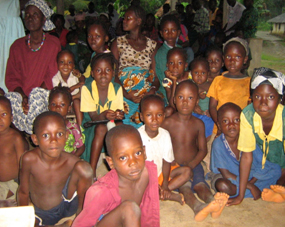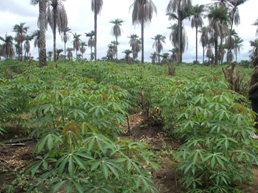November 2016
Proposed Project Title: Breaking the Marginalization Cycle: Technical Vocational Education and Training (TVET) & Skills Development for Pujehun District, Sierra Leone
Duration: 01.01.2017 to 31.12.2020
Concept Note: KNSL intends to support the people of Pujehun District, through the partner agency, Pujehun Youths for Development (PYD), by helping to establish a TVET Institute in the District Headquarters, Pujehun, to improve skills, employment and livelihood prospects for disadvantaged youth and women, including disabled people. The initiative is grounded on the premise that by targeting these beneficiaries, the programme would reach a major proportion of the population that has been denied access to high quality technical and vocational education and increase their employability. This would in turn translate into improved livelihoods for the beneficiaries, their families and the District as a whole.
Most of the ca. 300,000 people in Pujehun District are living in abject poverty. Many of them can hardly afford the basic human needs of adequate food, shelter, education, healthcare and clothing. Although the Government of Sierra Leone introduced free primary and junior secondary school (JSS) several years ago, few families have the resources to provide school materials, like exercise and texts books, uniforms and shoes, or to send their children away to be able to go to school in the towns.
Limited access to quality primary and secondary education in the District coupled with the weak performance of most students in state examinations and complete lack of a well-functioning TVET service in the District mean that poor students, particularly girls, are missing out on opportunities leading to better jobs, increased incomes and respected social roles.
As PYD noted in 2014, about 75% of the youth in the District have either never attended school or left school before completing basic education. In the remote riverine chiefdoms of Sakrim and Yakemo Kpukumu Krim for example, boys and girls often drop out of school quite early (average of 8-9) years) due to reasons related to family socialisation. Women have rather restricted economic and social rights: violated often by the widespread practice of FGM; parent-induced restrictions to education and property ownership; limited availability of health-care services; and vulnerability to maternity risk. In most instances, girls have to drop out of school at primary level in order to take care of their younger siblings, look after sick relatives, or to be married off to men / youth in the community, while the boys have to leave school to work to support their parents’ households.
A SWOT Analysis jointly carried out by KNSL and PYD in July 2015 indicated that the District is endowed with natural resources including fertile soil that is good for large scale agricultural activities. Diamond mining, though largely illicitly operated, has been going on in many parts of the District since the 1980s, iron-ore has been recently discovered in Kpaka and Gallines-Peri Chiefdoms and off-shore oil and gas are being explored (and perhaps mined) in the Atlantic along the coastlines of the District. During the protracted civil war, though, the majority of the population of the District lost their economic assets, including homes, farms, land and jobs as they fled as refugees to neighbouring countries or became internally displaced. A previous study by PYD 2013 in the District on “Agricultural Sector Development as Agent for Youth Employment and Poverty Reduction” found that the majority of the youth lived in villages where farming had been traditionally the main source of livelihood.
Farming resumed after the war, and assisted by development aid, production of some cash crops has to some extent recovered. The most widely grown food crops are rice and cassava. Commonly grown also are sweet potatoes, coconut, ground-nuts, oranges, bananas, mangoes, papaya and pineapples. Fishing, raising poultry and small ruminants as well as home gardening are also important livelihood activities. Yet, the District is recurrently hit by food deficit, which has got worse off since the outbreak of the deadly Ebola virus disease.
Low farm productivity and lack of gainful employment prospects have been pushing many young people to migrate to the mining areas and towns in search of work as day-labourers. From the SWOT Analysis, there is a tradition of informal craftsmanship learning in the District in areas like arts & crafts, weaving, tailoring, carpentry, masonry, blacksmithing, farming, fishing, food-processing and petty-trading. These days, however, many out-of-school young men and women would like to get more education, but as many of them are already out of regular school-going age, their wish is to learn non-traditional vocational skills.
But in their given circumstances, this option is far-fetched because there are no proper institutions to offer such an opportunity nearby, and it is still beyond the means of most families to allow their sons/daughters, or of young people (themselves as parents) to move to an urban area to acquire such training. The interest in traditional skills as well as non-traditional ones such as auto-mechanics, catering, hairdressing and beauty/cosmetics, has been on the rise since the end of the civil war, because they are seen by many young people as a path to social mobility and a remedy for broken dreams when they had to drop out of
school against their wish. The presence of a large number of unemployed and resource-poor youth in the society has been a socio-political concern for a long time. As highlighted in the SWOT Analysis, the politi¬cal and social consequences of youth disaffection is extensive in the District – evidenced in recent elections-related unrests.
The youth have also been at the forefront of demonstrations against the Sucfin oil-palm plantation project in Malen Chiefdom – agitating for a review of the previously negotiated land-lease agreement between the Government and Sucfin that led to the takeover of 85% of Chiefdom land. The problems of the youth in the District can be easily observed in the town squares of Pujehun Town, Massam, Yonni, Gobaru, Massah, Gbondapi and Bandajuma. In each of the communities, there is a cohort of young school leavers, teenage mothers, drop-outs, idlers, unskilled and underemployed day labourers, or hawkers without prospects of taking up further education or training in their locality. They wander aimlessly, or crowd around watching Western football league matches.
If these young people were mobilised and their potentials developed in an organised manner, they could really bring about great change in their lives and in the society. To this end, the development of a demand-driven, high quality TVET system, relevant to all sectors of the economy, at all levels, and to all the people, is considered by the Pujehun District Youth Council (PDYC) in particular as an effective strategy for creating a competent, motivated, adaptable and innovative workforce in the marginalised District.
The proposed TVET project will be implemented in four years. First two years of project phase between January 2017 and December 2018 will involve (a) constructing the Institute in Pujehun Town and establishing the demonstration farm and training workshops; (b) identifying and capacitating the Institute’s (Project’s) Steering Committee (Board), Management Team and the Teaching Staff; and (c) Designing & Developing the curricula and training/learning materials. The project’s second phase – January 2019 to December 2020 – will be devoted to the delivery of TVET training and support services at the newly constructed Institute in line with the Government’s TVET policy. At least 1,860 youth, among them 30% women and 5% persons with disabilities, will be enrolled/trained in short- and long-term courses by December 2020. It is anticipated that at least 75% of those trained will be able to put their skills into use within 6 months of completion. Access to TVET will increase labour productivity in the District and lead to higher income generation capabilities for women and youth. This in turn can accelerate poverty reduction and improve living conditions.




